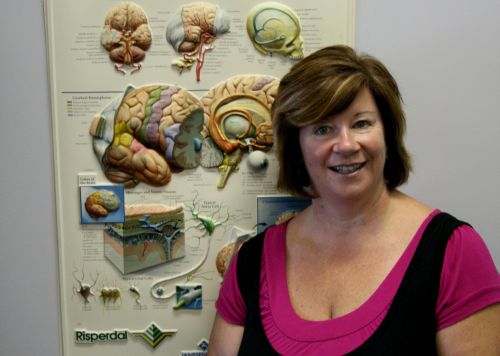
On Tuesday night NBN News explored research into how people with schizophrenia process facial expressions.
Dr Carmel Loughland, a Senior Research Fellow of the Schizophrenia Research Institute, aims to understand why this occurs and to design tools to help people with schizophrenia live healthier, happier lives.

Around 1 in 100 people will develop schizophrenia during their lifetime. The disease ranks among the top 10 causes of disability in developed countries worldwide. Around 2,000 people are newly diagnosed annually in Australia.
The illness causes a difficulty in thinking and emotion. As a result, people with the condition can have difficulty interpreting facial expressions or telling the difference between emotions such as anger and happiness.
What have you discovered?
We have pioneered a novel tool for recording eye movements as people look at faces and social scenes. This provides an objective, real time measure of people’s mental processing strategies. This knowledge has the potential to improve the identification of people at risk of developing schizophrenia and identify appropriate treatment strategies.
Additionally, we discovered that the biological first-degree relatives of people with schizophrenia also have disturbances in their processing of facial expressions, suggesting this problem may represent a vulnerability marker for developing the disorder.
Why is this significant?
It has been realised that the inability to process emotion and to function socially can be just as debilitating for people long-term as some of the acute symptoms of schizophrenia. The findings from our research and our colleagues is helping to identify what the problems are and how we might address these clinically to improve patients’ health and quality of life.
What do you hope to achieve in the future?
Schizophrenia and other mental illnesses rob people of basic everyday prospects – of having a job and a house, making friends, meeting a partner, and enjoying a social life. I want my research to change all that.
I hope to unlock some of the secrets about schizophrenia and why emotion is affected in those individuals. Then I want to help develop strategies that might help them overcome those problems.
What have you achieved since receiving the PULSE Award for Early Career Research in 2006?
The award has provided me with opportunities to establish new collaborative research links with others. Our research has been published in high impact psychiatric journals. It has also been presented at national and international scientific meetings, and been the subject of both local and European symposium workshops which I have chaired.
Carmel is a conjoint appointment of the University of Newcastle and a member of the HMRI Brain and Mental Health Research Program. Her research has been supported by HMRI including a significant donation from an anonymous donor.
HMRI would like to acknowledge the Traditional Custodians of the land on which we work and live, the Awabakal and Worimi peoples, and pay our respects to Elders past and present. We recognise and respect their cultural heritage and beliefs and their continued connection to their land.

Hunter Medical Research Institute
We’re taking healthy further.
Locked Bag 1000
New Lambton
NSW, Australia, 2305



This site is protected by reCAPTCHA and the Google Privacy Policy and Terms of Service apply.
Copyright © 2024 Hunter Medical Research Institute | ABN: 27 081 436 919
Site by Marlin Communications
